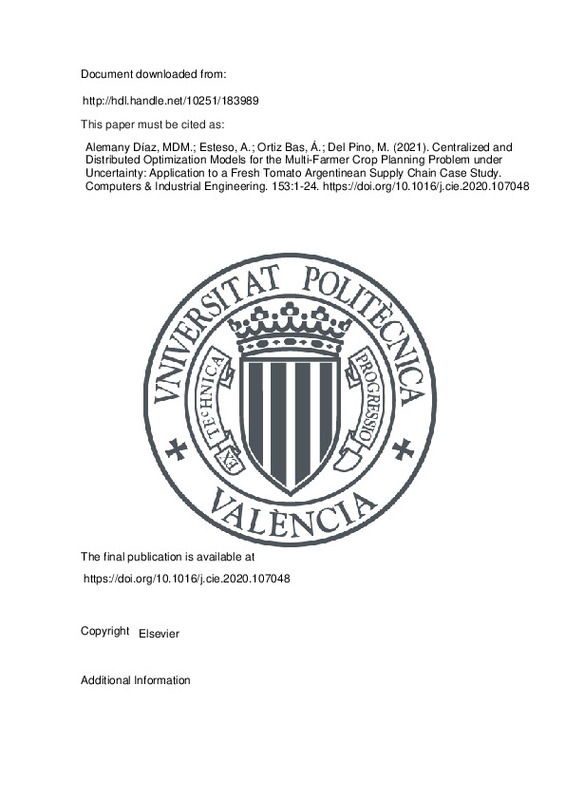JavaScript is disabled for your browser. Some features of this site may not work without it.
Buscar en RiuNet
Listar
Mi cuenta
Estadísticas
Ayuda RiuNet
Admin. UPV
Centralized and Distributed Optimization Models for the Multi-Farmer Crop Planning Problem under Uncertainty: Application to a Fresh Tomato Argentinean Supply Chain Case Study
Mostrar el registro sencillo del ítem
Ficheros en el ítem
| dc.contributor.author | Alemany Díaz, María Del Mar
|
es_ES |
| dc.contributor.author | Esteso, Ana
|
es_ES |
| dc.contributor.author | Ortiz Bas, Ángel
|
es_ES |
| dc.contributor.author | del Pino, Mariana
|
es_ES |
| dc.date.accessioned | 2022-07-08T18:05:06Z | |
| dc.date.available | 2022-07-08T18:05:06Z | |
| dc.date.issued | 2021-03 | es_ES |
| dc.identifier.issn | 0360-8352 | es_ES |
| dc.identifier.uri | http://hdl.handle.net/10251/183989 | |
| dc.description.abstract | [EN] Imbalance between supply and demand of crops frequently occurs in markets originating an excess or shortage of supply in relation to demand. This causes high volatility and uncertainty in market prices, unmet demand, and waste, especially for fresh crops due to their limited shelf-life. This imbalance is mainly due to the inherent uncertainty present in the agricultural sector, the perishability of fresh crops, and the lack of coordination among farmers when making planting and harvesting decisions. Despite farmers usually plan the planting and harvesting in an individual way, there is a scarcity of research addressing the crop planning problem in a distributed manner and, even less, assessing their impact on the supply chain (SC) as a whole. In this paper, we developed a set of novel mathematical programming models to plan the planting and harvest of fresh tomatoes under a sustainable point of view for multi-farmer supply chains under uncertainty in different decision-making scenarios: i) distributed, ii) distributed with maximum and minimum land area constraints to be planted for each crop, iii) distributed with information sharing, and iv) centralized. Then, for each distributed scenario, the individual solution per farmer as regards the planting and harvesting decisions per crop are integrated to obtain the overall supply to satisfy the markets demand. This allows the assessment of the farmers¿ real performance and the impact of their individual decisions to the entire SC performance. We also compare the results obtained for each scenario with the centralized model in terms of economic, environmental, and social impact. The experimental design shows that, when integrating the solutions for the whole SC, significant differences between planned and real results are obtained in each scenario as regards the gross margin per hectare, unmet demand, waste, and unfairness between farmers, being the distributed model with information sharing the most similar to the centralized one. The results show that uncertainty consideration in models improves the gross margin and the unfairness among farmers in all scenarios for both, planned and real evaluation. | es_ES |
| dc.description.sponsorship | The authors acknowledge the partial support of the European Union's research and innovation programme under the H2020 Marie Sklodowska-Curie Actions with the grant agreement No 691249, Project entitled 'Enhancing and Implementing Knowledge based ICT solutions within high Risk and Uncertain Conditions for Agriculture Production Systems' (RUC-APS). The second and third author also acknowledges the partial support of the Programme of Formation of University Professors of the Spanish Ministry of Education, Culture, and Sport [grant number FPU15/03595]. | es_ES |
| dc.language | Inglés | es_ES |
| dc.publisher | Elsevier | es_ES |
| dc.relation.ispartof | Computers & Industrial Engineering | es_ES |
| dc.rights | Reconocimiento - No comercial - Sin obra derivada (by-nc-nd) | es_ES |
| dc.subject | Planting | es_ES |
| dc.subject | Harvesting | es_ES |
| dc.subject | Fuzzy optimization | es_ES |
| dc.subject | Centralized and distributed decision-making | es_ES |
| dc.subject | Fresh tomato supply chain | es_ES |
| dc.subject.classification | ORGANIZACION DE EMPRESAS | es_ES |
| dc.title | Centralized and Distributed Optimization Models for the Multi-Farmer Crop Planning Problem under Uncertainty: Application to a Fresh Tomato Argentinean Supply Chain Case Study | es_ES |
| dc.type | Artículo | es_ES |
| dc.identifier.doi | 10.1016/j.cie.2020.107048 | es_ES |
| dc.relation.projectID | info:eu-repo/grantAgreement/EC/H2020/691249/EU | es_ES |
| dc.relation.projectID | info:eu-repo/grantAgreement/MECD//FPU15%2F03595/ES/FPU15%2F03595/ | es_ES |
| dc.rights.accessRights | Abierto | es_ES |
| dc.contributor.affiliation | Universitat Politècnica de València. Departamento de Organización de Empresas - Departament d'Organització d'Empreses | es_ES |
| dc.description.bibliographicCitation | Alemany Díaz, MDM.; Esteso, A.; Ortiz Bas, Á.; Del Pino, M. (2021). Centralized and Distributed Optimization Models for the Multi-Farmer Crop Planning Problem under Uncertainty: Application to a Fresh Tomato Argentinean Supply Chain Case Study. Computers & Industrial Engineering. 153:1-24. https://doi.org/10.1016/j.cie.2020.107048 | es_ES |
| dc.description.accrualMethod | S | es_ES |
| dc.relation.publisherversion | https://doi.org/10.1016/j.cie.2020.107048 | es_ES |
| dc.description.upvformatpinicio | 1 | es_ES |
| dc.description.upvformatpfin | 24 | es_ES |
| dc.type.version | info:eu-repo/semantics/publishedVersion | es_ES |
| dc.description.volume | 153 | es_ES |
| dc.relation.pasarela | S\423584 | es_ES |
| dc.contributor.funder | COMISION DE LAS COMUNIDADES EUROPEA | es_ES |
| dc.contributor.funder | Ministerio de Educación, Cultura y Deporte | es_ES |
| dc.subject.ods | 02.- Poner fin al hambre, conseguir la seguridad alimentaria y una mejor nutrición, y promover la agricultura sostenible | es_ES |
| dc.subject.ods | 11.- Conseguir que las ciudades y los asentamientos humanos sean inclusivos, seguros, resilientes y sostenibles | es_ES |
| dc.subject.ods | 12.- Garantizar las pautas de consumo y de producción sostenibles | es_ES |







![[Cerrado]](/themes/UPV/images/candado.png)

